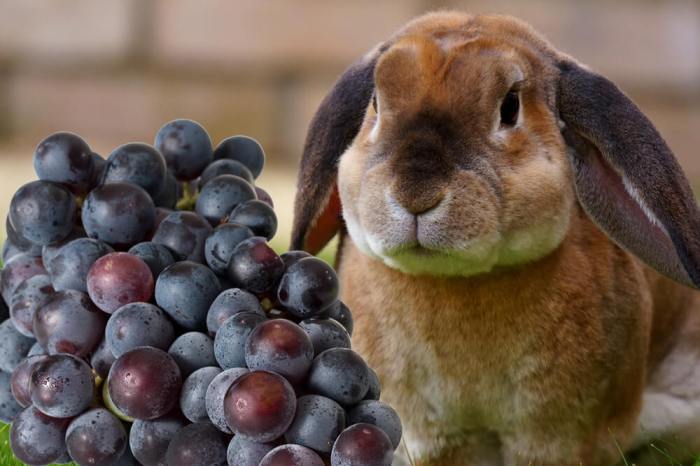Grapes are a delicious and nutritious fruit for humans, but can our furry friends enjoy them too? The answer to “Do rabbits eat grapes?” is yes, but with some important considerations. In this comprehensive guide, we will delve into the nutritional benefits, recommended serving sizes, preparation methods, potential health concerns, and alternatives to grapes for rabbits.
Understanding the dietary needs of rabbits is crucial for their well-being. Grapes, while not a staple food for rabbits, can be an occasional treat when offered in moderation and prepared appropriately. Let’s explore the details to ensure the safety and health of our beloved bunnies.
Nutritional Benefits of Grapes for Rabbits
Grapes are a low-calorie fruit that contains a variety of nutrients that can benefit rabbits’ health. They are a good source of fiber, which is essential for rabbits’ digestive health. Grapes also contain vitamins A, C, and K, as well as minerals such as potassium and manganese.
These nutrients can help support rabbits’ immune systems, eyesight, and overall health.
Potential Risks of Feeding Grapes to Rabbits
While grapes can be a healthy treat for rabbits, it is important to feed them in moderation. Grapes are high in sugar, which can lead to weight gain and other health problems if rabbits eat too many of them. Grapes also contain a small amount of a toxin called tartaric acid, which can be harmful to rabbits if they eat too much of it.
Recommended Serving Size and Frequency
While grapes offer nutritional benefits, moderation is crucial. Overfeeding grapes can lead to digestive issues and weight gain. The recommended serving size for rabbits is a small handful, about 2-3 grapes, once or twice a week.
The high sugar content in grapes can cause gastrointestinal distress if consumed in large quantities. Hence, it’s essential to offer grapes sparingly as a treat, not as a regular part of their diet.
Frequency
Rabbits can safely consume grapes once or twice a week. More frequent consumption may increase the risk of digestive problems.
Serving Size
A small handful of grapes, about 2-3 grapes, is an appropriate serving size for rabbits.
Preparation and Serving Methods
Preparing grapes for rabbits is essential to ensure their safety and well-being. Before offering grapes to your rabbit, it’s crucial to wash them thoroughly under running water to remove any dirt or pesticide residue. Additionally, remove any seeds from the grapes, as they can be harmful to rabbits.Once
the grapes are prepared, you can serve them to your rabbit in various ways. You can offer them whole, which encourages natural foraging behavior. Alternatively, you can slice the grapes into smaller pieces for easier consumption. Mashed grapes are another option, especially for younger rabbits or those with dental issues.
Regardless of the serving method, ensure that the grapes are fresh and free from any signs of spoilage.
Monitoring and Potential Health Concerns
After introducing grapes into your rabbit’s diet, it’s crucial to observe them closely for any signs of digestive upset. This includes monitoring for symptoms such as diarrhea, bloating, or a decreased appetite. If your rabbit exhibits any of these symptoms, discontinue grape consumption and consult with your veterinarian promptly.
Potential Health Concerns
While grapes are generally safe for rabbits in moderation, excessive consumption can lead to health issues. The high sugar content in grapes can contribute to weight gain and dental problems if fed in large quantities. Additionally, some rabbits may be allergic to grapes, which can manifest as skin irritation or respiratory distress.
Alternatives to Grapes

While grapes can be a healthy treat for rabbits, it’s important to offer them a variety of fruits and vegetables to ensure a balanced diet. Here are some other fruits and vegetables that are safe and nutritious for rabbits:
Apples
Apples are a good source of vitamin C, potassium, and fiber. They are also low in calories and sugar, making them a healthy snack for rabbits.
Bananas
Bananas are a good source of potassium, vitamin B6, and dietary fiber. They are also high in sugar, so they should be given to rabbits in moderation.
Blueberries
Blueberries are a good source of antioxidants, vitamin C, and fiber. They are also low in calories and sugar, making them a healthy treat for rabbits.
Carrots
Carrots are a good source of vitamin A, vitamin K, and fiber. They are also low in calories and sugar, making them a healthy snack for rabbits.
Celery
Celery is a good source of vitamin K, vitamin C, and fiber. It is also low in calories and sugar, making it a healthy snack for rabbits.
Last Point
In conclusion, rabbits can enjoy grapes as an occasional treat, but it’s essential to follow the guidelines discussed above. By understanding the nutritional value, recommended serving sizes, preparation methods, and potential health concerns, you can safely share this sweet delight with your furry companion.
Remember, a balanced diet that includes a variety of hay, fresh vegetables, and limited fruits is key to maintaining a healthy and happy rabbit.
FAQ Section
Can rabbits eat grapes with seeds?
No, rabbit owners should remove the seeds from grapes before feeding them to their rabbits. Grape seeds contain amygdalin, a compound that can release cyanide when ingested in large quantities, which can be toxic to rabbits.
How often can rabbits eat grapes?
Grapes should be given to rabbits as an occasional treat, no more than once or twice a week. Overfeeding grapes can lead to digestive issues and weight gain due to their high sugar content.
What are some healthy alternatives to grapes for rabbits?
There are several healthy fruits and vegetables that are safe and nutritious for rabbits, including apples, bananas, carrots, celery, and dandelion greens. These alternatives provide essential vitamins, minerals, and fiber without the high sugar content of grapes.